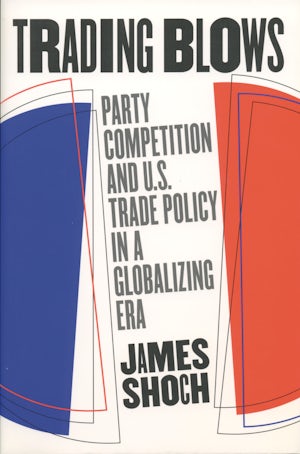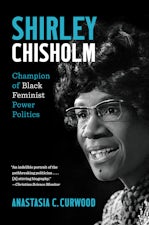Trading Blows
Party Competition and U.S. Trade Policy in a Globalizing Era
By James Shoch
400 pp., 6.125 x 9.25, notes, index
-
Paperback ISBN: 978-0-8078-4975-0
Published: September 2001 -
E-book PDF ISBN: 979-8-8908-7354-5
Published: January 2003 -
E-book EPUB ISBN: 978-0-8078-7531-5
Published: January 2003
Buy this Book
- Paperback $47.50
- E-Book $29.99
Shoch offers detailed case studies of almost all of the major trade issues of the Reagan, Bush, and Clinton eras, including administrative and legislative efforts to curb auto, steel, and other imports and to open up markets in Japan and elsewhere, as well as free-trade initiatives such as the North American Free Trade Agreement (NAFTA), the General Agreement on Tariffs and Trade (GATT) treaty that concluded the Uruguay Round of international trade talks, the extension of presidential fast-track trade negotiating authority, and the approval of permanent normal trade relations with China. In so doing, he explains the complex patterns of party competition over U.S. trade policy since 1980 and demonstrates the significant impact that party politics has had on the nation's recent trade policy decisions.
About the Author
James Shoch is assistant professor of government at California State University, Sacramento.
For more information about James Shoch, visit
the
Author
Page.
Reviews
"Very well researched. . . . Shoch does a very good job of developing a robust conceptual political-economic framework for the discussion. . . . Discussion is well laid out and well documented. Excellent chapter references."--Choice
"Challenges the common wisdom that during most of the post-World War II period party conflict had little significance for trade. . . . An insightful study of congressional trade politics, based on House and Senate floor voting patterns."--Journal of American History
"For evidence on just why Congress has become so fractious on trade issues, readers can turn to Shoch."--Foreign Affairs
"Demonstrates the value of close historical analysis illuminated by theory, and makes a compelling case for the importance of partisan calculation in trade politics and policy. It is an informed and insightful addition to the literature on American trade politics."--American Politics
"The central thesis of this original and important work is that with the advance of globalization since 1980, trade policy has moved to the forefront of American politics, resulting in an increased role for parties in trade conflicts. Constituency pressure, personal ideology, and partisan electoral ambition have all contributed to heightened partisanship over trade issues. Shoch's explication of how these factors shifted so as to create these disagreements is excellent."--David W. Brady, Stanford University
"James Shoch's timely Trading Blows is a brilliant investigation of the determinants and consequences of party competition over U.S. trade policy during the Reagan, Bush, and Clinton years. Theoretically innovative and meticulously researched, the book convincingly argues that party politics has had a significant impact on the recent conduct of American commercial policy. His historically rich discussion of the role of trade policy in the constitution of successive partisan political orders is a particularly valuable contribution. With this volume, Shoch has greatly enriched our understanding of both the dynamics of American party competition and the nature of the U.S. foreign economic policy process."--Louis Ferleger, Boston University




